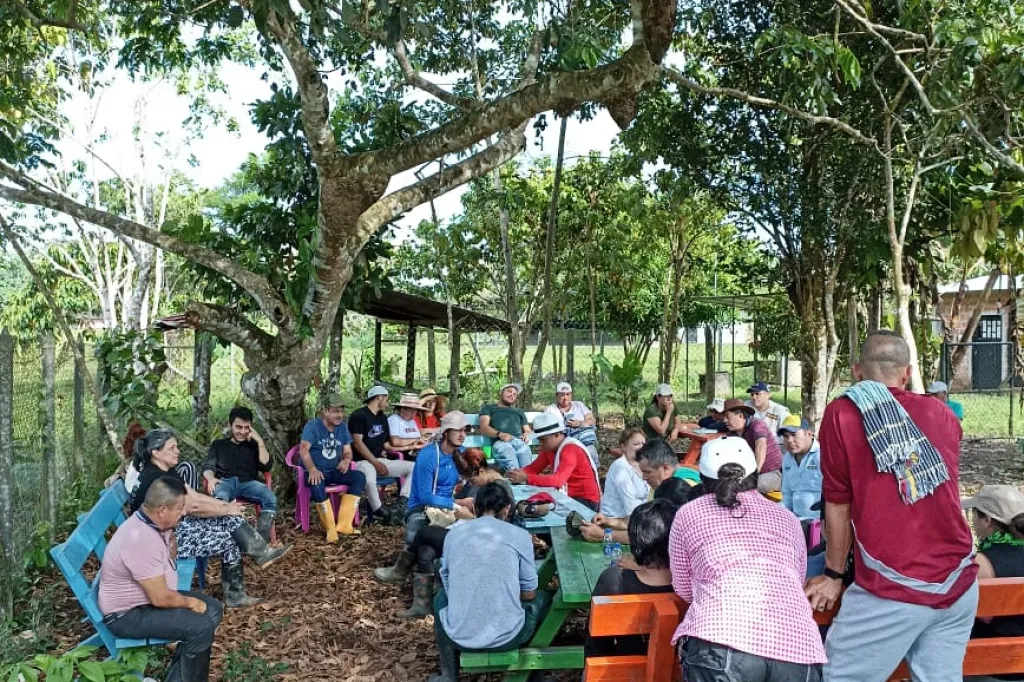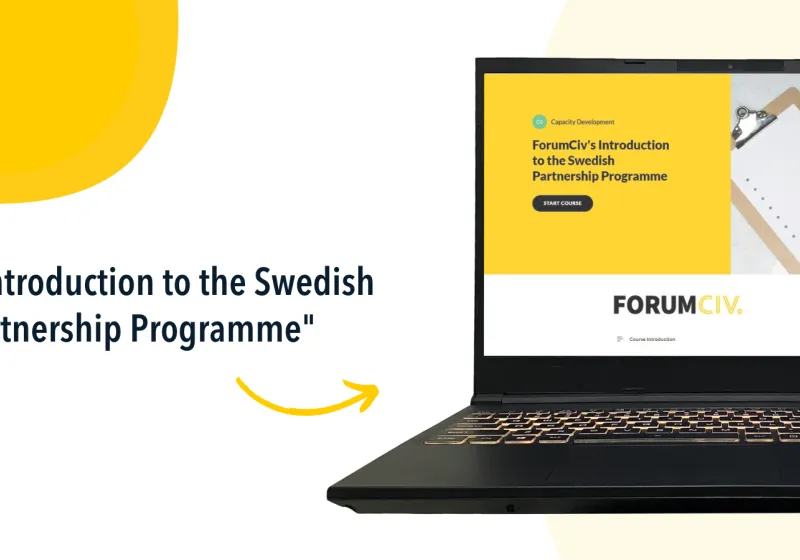Hutches of life (Part 2)
By César Augusto Muñoz M.
Program Coordinator ForumCiv LAC

The barter
Dozens of peasants left Arauca, crossed the eastern mountain range, passed through the Sumapaz páramo (moors), went down the trails of the central mountain range to the Colombian Massif, on the Huila side, surrounded the Cauca boot through the foothills and found themselves face to face with the gateway to the Amazon in the lower Putumayo. All this journey was made to fulfil the commitment to meet and learn from the environmental conservation experiences that are developed in this territory. It was more than 40 hours of bus travel.
The day began by bartering "flavours and knowledge": golden berry, dehydrated Amazonian pineapples, handicrafts, bananas, coffee, cheese, books and photographs. All these elements were garnishing the main table of the communal hut in the village of La Pedregosa in the Amazon Pearl Peasant Reserve Zone - ZRCPA its Spanish acronym. This exchange, apparently a series of simple actions, allows me to reflect about a complex idea: it is only possible to save the Amazon if it is recognized that the ecosystems and the historical, social, and environmental relationships within them are intimately linked.
The feeling that the exchange of products cropped in the plains, the Andean highlands and the Amazon macro-basin is a special and exceptional activity, reveals that despite the strong relationships that unite these peasant communities, the reconfiguration of the armed conflict and the failed implementation of the Peace Agreement has left the social movement, especially the peasants, in a critical state of fragmentation.
"Our organizational processes are fragmented, and this can be seen in the ecosystems," says Catalina Oviedo, a member of the Center of Alternatives for Development (CEALDES its Spanish acronym), an organization of young professionals committed to strengthening community processes for the protection of territories and biodiversity. She is right; in other political and social conditions the landscape of a journey from the eastern plains to the Amazon would be a spectacle of interconnected ecosystems between productive forests, peasant reserve areas, indigenous reserves, community councils of afro-descendant communities and other figures of land management and protection. This vision of a future is possible if the peasantry is also taken into account as an agent for the protection of the Amazon.
For this reason, within the framework of this agro-environmental fair, the participating organizations decided to jointly elaborate a public statement in which the peasants demanded that all decisions at the Amazon Summit include the participation of the peasantry. It is important to recognize that in the last few days the Ministry of Environment of Colombia carried out a series of local dialogues in each of the departments of the Colombian Amazon region, to gather the ideas of the different social sectors before the Summit in Belem do Pará.
Climate justice
The Amazon is a biome that since Republican times has been at the centre of global economics and politics. Contradictorily, it has been one of the places on the planet where extraction and genocide have been the driving force behind the current civilizational crisis. In the same way, the Amazon is a central part of the solution to mitigate the environmental damage generated by this system that prioritizes profit over life.
For this reason, in the memories of those who know the territory, there are still memories of the rubber genocide, the peasant colonisations led in the midst of bipartisan violence, the total abandonment of the State condemning them to hunger, the oil boom and its environmental damage, the cocalero bonanzas and their respective failures and the first peasant marches that resulted in the creation of the Peasant Reserve Zones. All this contradictory past is present in the statement made by the environmental leader of the Amazon, Jani Silva: "we are not workforce to plant trees, and we are not deforesters".
This means that the way to save the Amazon is not by condemning peasant and indigenous communities to backwardness, marginalization and exploitation in order to preserve an idea of pristine nature with colourful rivers where the most polluting countries can wash their guilt, demanding that the countries of the region protect the territory, while they, on the other hand, make a minimal effort to regulate and reduce greenhouse gas emissions.
To recognize and act on this unequal correlation of forces is to advance climate and agrarian justice. One of the most powerful voices on this path today is Colombian President Gustavo Petro, who has been known for taking a clear message on climate change to international and multilateral organizations. That is why the Amazon Summit must maintain and develop this spirit of justice and take advantage of this opportunity to build bridges of unity between indigenous, peasant and afro-descendant communities in America.
In Mexico, the philosopher, sociologist, and journalist Armando Bartra speaks of peasants as those subjects whose knowledge and practices provide the paradigms for the future to confront the crisis. In this part of the world, the impulse and support of democratic states with the capacity to settle the historical debts with the Amazonian communities can make the Summit a global milestone of climate and agrarian justice that allows to position the community ways of life as a mechanism to save the planet and why not start designing a biological connection between the páramo and the Amazon, where the Peasant Reserve Zones and the intercultural territories are connected with the indigenous reserves and the community councils, to the point of building forms of popular cooperation between nations that allow us to unite the forest from the Quilombolas in Brazil (African and Afro-descendant community that escaped from slavery) all the way through to the Amazonian plurinationalities in Bolivia.
Other recent articles

7 recommendations for EU policymakers after the development in Georgia
After the Law on Transparency of Foreign Influence in Georgia, here are seven concrete actions that EU Decision Makers need to take.

Kenya’s Chief Justice Hon. Martha Koome launches ForumCiv’s report on public policy gaps
“The findings from this research we are launching today stresses the importance of continuous tailormade trainings for all stakeholders involved in policy development from county officials to members...

New e-learning course presents the Swedish Partnership Programme
This course is especially relevant to newer organizations and/or those who have experienced challenges in various application processes. It presents the Swedish Partnership Programme.